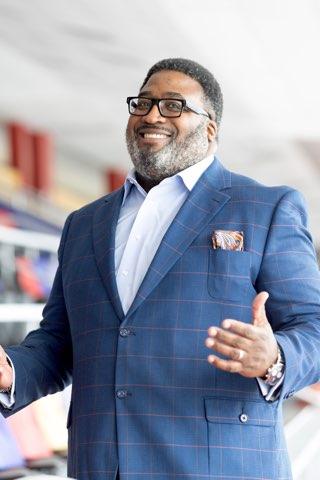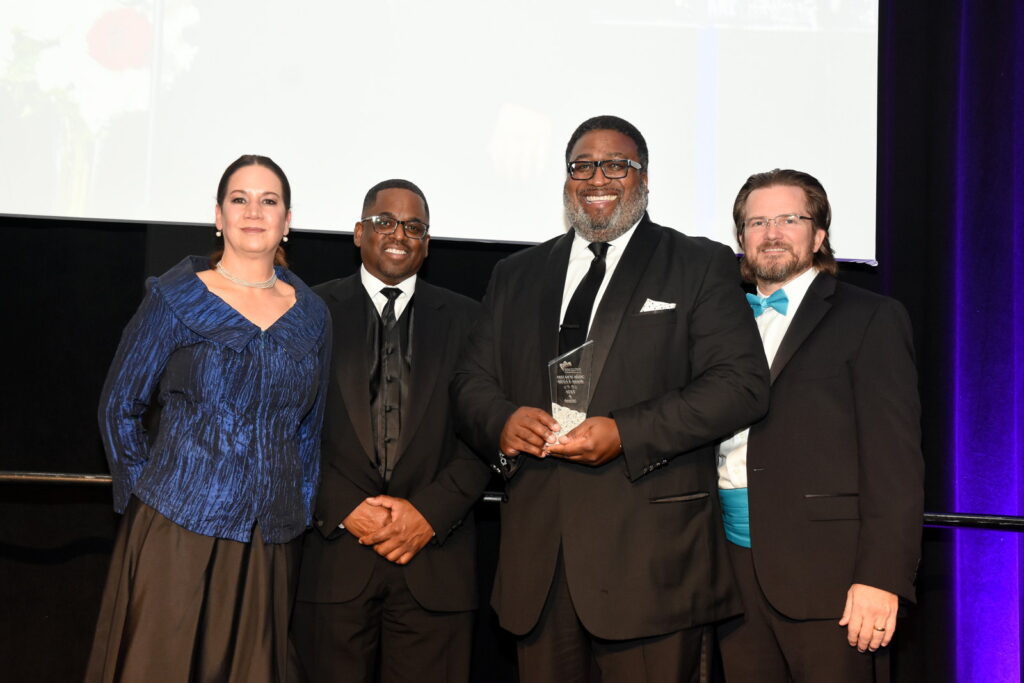When I get revenue from you, I’m going into the community and build the schools for the next generation of leaders so that they are future-ready so that they can be employable, and entrepreneurial.”
Such is the focus of Farad Ali, President and Chief Executive Officer of Asociar, LLC, a company specializing in delivering IT solutions, services, and equipment, as well as providing end-to-end payment solutions for business and developing supply chain solutions. The company’s byline is “Providing Solutions, Empowering Communities.” It is a mission taken on wholeheartedly.
Farad has been tremendously successful in business and he consistently “pays it forward” in his work and personal life. He knows for certain that the only way our collective future will be positively shaped is by investing in our youth. He believes that “… we can feed this pipeline of diverse leaders in business, in government, and in nonprofits. And we know in our world that we need all three of those to work well together to get to the outcomes that are desired, which is people operating at their highest and best.”
Though capitalism seems primarily focused on beating out the competition, Farad feels that what is more rewarding for everyone is a competitive spirit in business wherein everyone benefits through mutual goals and support. It’s a mindset that

encourages everyone to aspire to do their best and help others grow and be successful in the process. It’s an approach that actualizes equality and equity simultaneously.
“I want to hire more people who are ethnically, socially, and culturally diverse. All people from our community, and we want to have a positive impact to elevate everyone’s opportunity to achieve their highest and best for their families and communities,” Farad says.
One area that Farad puts his energy toward is mentoring programs for young people through his program called Planet Mogul. “We’re investing in the schools in a way that teachers get energized to see that the community cares. And when I get entrepreneurs to come in to be tutors or teachers in the community, they get re-inspired about their own life’s mission.” Farad tells young people that he doesn’t want them to be just mentally intelligent, but emotionally intelligent and culturally intelligent.
“You want young people to build their lives on a stable foundation of principles, to get their creativity mindset activated early on so they can begin creating ecosystems for success. That way,” Farad explained, “you can do all the things you want to do. You don’t want your 50-year-old self to be mad at your 26-year-old self,” by which he means that you don’t want to be emotionally 26 when you’re physically 50 years old. That’s a recipe for great disappointment, as well as it isn’t going to work well out in the world.
One thing Farad has been outspoken about is that not only with businesses but with individuals, we need more than just talk and verbal commitments. He’s an action-oriented guy, so what he wants from corporations and people is the execution of commitments.
Farad says, “I really want to pay it forward and open up pathways. That’s what I’m trying to do with my voice, to show that we can do good and do well. But we need to make sure we have the commitment for execution for helping make sure businesses like mine not just survive but thrive.”
In his many endeavors, Farad has found that mentoring and sponsoring relationships are what feed growth and development. “I try to demonstrate that in the way I live, work, and give. You can talk to the grassroots and the grasstops and no one will know the difference. I try to keep it real and transparent. I think it’s critical that the foundation needs to be fed as much as those at the top.”
This speaks to the idea of actualizing equality and equity simultaneously. That’s done through inclusiveness. As Farad says, “I look at inclusion and diversity not as a program but as a purpose leading to an outcome.” The fact is that we’re already diverse, but we’re not fully inclusive and we don’t have economic parity. That’s where equity comes into play.
“Inclusion just means that we’re going to be inclusive, but equity is an outcome. Through that, we can create an equitable, humane society,” Farad stated. “I’m a proponent that if I can be a catalyst, to be able to have a good business and grow a business to become a bigger business, then I can also be more philanthropic in my community, which would give everyone more opportunity and access. And I just happen to be focusing on kids and helping them to be entrepreneurial so that they can have the tools to be future-ready.”

Farad puts great emphasis on helping not just young people, but people of any age understand that they can be part of an ecosystem that builds their community and their families — all by beginning with themselves. “We need each other, and we need to get to a place where we collaborate. We have to build the strand of humanity in a way that allows for us to want equity for everyone.”
Farad aims to inspire, transform, develop, and build people to be at their highest, to self-actualize, and optimize their time here on Earth. “If we are not intentionally inclusive, we will be unintentionally exclusive. I’d like to be a catalyst or conduit for helping people be their best.” ●


